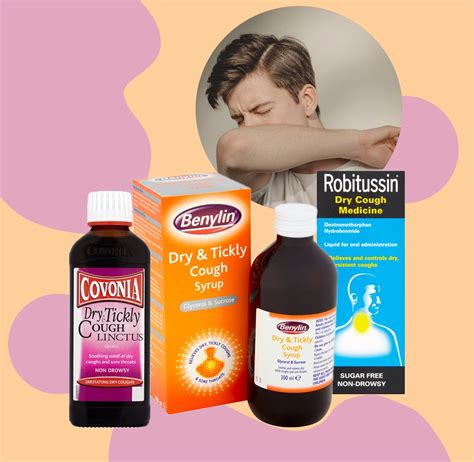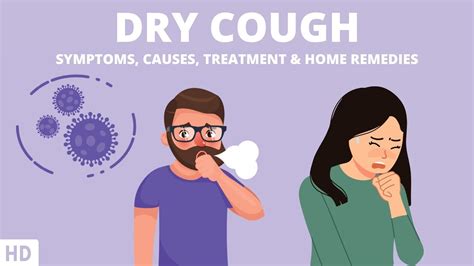Intro
Dry coughs can be a frustrating and uncomfortable experience, often disrupting daily life and making it difficult to get a good night's sleep. The importance of finding effective relief cannot be overstated, as prolonged dry coughs can lead to further complications such as throat irritation, chest pain, and even respiratory infections. Understanding the causes and symptoms of dry coughs is crucial in selecting the best medications and treatments. With the vast array of over-the-counter (OTC) medications and prescription drugs available, navigating the options can be overwhelming. This article aims to provide a comprehensive guide to the best medications for dry coughs, exploring their benefits, working mechanisms, and potential side effects.
The prevalence of dry coughs is significant, affecting millions of people worldwide. They can be caused by a variety of factors, including viral infections, allergies, environmental irritants, and even certain types of medications. Dry coughs are characterized by their lack of mucus production, distinguishing them from productive coughs. This distinction is important, as the treatment approach can vary significantly depending on the type of cough. Effective management of dry coughs not only alleviates symptoms but also prevents potential complications, making it essential to choose the right medication.
Dry coughs can significantly impact quality of life, affecting not only the individual suffering from the cough but also their family and community. The constant coughing can lead to fatigue, irritability, and difficulty concentrating, among other issues. Furthermore, the economic burden of dry coughs should not be underestimated, with costs associated with healthcare visits, medications, and lost productivity. Therefore, finding the most effective and efficient treatments is crucial, both for individual well-being and for broader societal benefits.
Understanding Dry Cough Medications

Understanding how different medications work is key to selecting the best treatment for a dry cough. There are several categories of medications, each targeting different aspects of the coughing mechanism. Cough suppressants, for example, work by reducing the brain's cough reflex, providing quick relief from coughing spells. Expectorants, on the other hand, help loosen and clear mucus from the airways, which can be beneficial even in dry coughs by preventing the buildup of irritants. Additionally, combination products that include decongestants, antihistamines, and pain relievers can address multiple symptoms simultaneously, such as congestion, runny nose, and headache, which often accompany a dry cough.
Types of Medications for Dry Cough
The variety of medications available for dry coughs includes both over-the-counter (OTC) options and prescription drugs. OTC medications are widely available and can be purchased without a doctor's prescription. They include cough suppressants like dextromethorphan and expectorants such as guaifenesin. Prescription medications, however, are stronger and are used for more severe cases or when OTC options are ineffective. They may include codeine-based cough suppressants and other specialized medications tailored to the individual's specific condition and medical history.Benefits and Side Effects of Dry Cough Medications

Each medication for dry coughs has its benefits and potential side effects. For instance, cough suppressants can provide rapid relief from coughing but may cause drowsiness, dizziness, and in rare cases, more serious side effects like seizures or hallucinations, especially when taken in excess or by children. Expectorants are generally safer but may not be as effective for everyone, and their action can be slower. It's crucial to follow the dosage instructions carefully and be aware of potential interactions with other medications or health conditions.
Choosing the Right Medication
Choosing the right medication for a dry cough involves considering several factors, including the severity of the cough, the presence of other symptoms, and the individual's health status and medical history. For mild dry coughs, OTC options may suffice, while more severe cases may require prescription medications. Additionally, the time of day can influence the choice of medication; for example, a non-drowsy formula might be preferred for daytime use, while a medication that promotes sleep could be better suited for nighttime.Alternative Treatments for Dry Cough

Besides medications, there are several alternative treatments and home remedies that can help alleviate dry coughs. Staying hydrated by drinking plenty of fluids, such as water, tea, and soup, can help thin out mucus, making it easier to expel. Using a humidifier can add moisture to the air, reducing throat irritation. Throat lozenges and cough drops can provide temporary relief by soothing the throat. Honey has natural cough-suppressing properties and can be consumed on its own or mixed with warm water or tea. Avoiding irritants such as smoke and dust, and getting plenty of rest, are also crucial in managing dry coughs.
Lifestyle Changes for Managing Dry Cough
Making certain lifestyle changes can significantly impact the management of dry coughs. Quitting smoking, for instance, can greatly reduce the frequency and severity of coughing spells, as smoking is a major irritant to the lungs and airways. Avoiding exposure to pollutants and allergens, such as pet dander, pollen, and mold, can also help prevent dry coughs. Practicing good hygiene, such as washing hands frequently, especially during cold and flu seasons, can reduce the risk of catching a viral infection that might lead to a dry cough.Prevention of Dry Cough

Preventing dry coughs is always better than treating them. This can be achieved through a combination of lifestyle modifications and preventive measures. Maintaining a healthy diet rich in fruits, vegetables, and whole grains can boost the immune system, reducing the likelihood of getting sick. Regular exercise can also enhance immune function and overall health. Getting vaccinated against flu and pneumonia can prevent infections that often lead to dry coughs. Furthermore, managing stress through techniques like meditation, yoga, or deep breathing exercises can help keep the immune system strong.
Vaccinations and Dry Cough Prevention
Vaccinations play a critical role in preventing infections that can lead to dry coughs. The flu vaccine, for example, is recommended annually for everyone six months of age and older, as it protects against the influenza virus, which is a common cause of dry coughs. The pneumonia vaccine is recommended for certain age groups and individuals with specific health conditions, as it protects against pneumococcal disease, which can cause pneumonia, a condition often accompanied by dry cough.Conclusion and Next Steps

In conclusion, managing dry coughs effectively requires a comprehensive approach that includes understanding the causes, selecting the appropriate medication, and incorporating lifestyle changes and preventive measures. By being informed and proactive, individuals can find relief from the discomfort and disruption caused by dry coughs. It's essential to consult with a healthcare provider to determine the best course of treatment, especially if symptoms persist or worsen over time.
Final Thoughts on Dry Cough Management
Effective dry cough management is within reach for most individuals. By combining the right medications with alternative treatments and preventive strategies, people can alleviate their symptoms and improve their quality of life. Remember, if a dry cough persists or is accompanied by other concerning symptoms such as fever, chest pain, or difficulty breathing, seeking medical attention is crucial.What are the most common causes of dry cough?
+Dry coughs can be caused by viral infections, allergies, environmental irritants, and certain medications. Understanding the cause is crucial for effective treatment.
How do I choose the best medication for my dry cough?
+Choosing the right medication depends on the severity of the cough, other symptoms, and individual health status. Consulting with a healthcare provider can help determine the best option.
Are there any home remedies that can help alleviate dry coughs?
+Yes, staying hydrated, using a humidifier, throat lozenges, and honey can provide relief from dry coughs. Lifestyle changes such as quitting smoking and avoiding pollutants can also help.
We hope this comprehensive guide has provided you with valuable insights into managing dry coughs effectively. If you have any further questions or would like to share your experiences with dry cough treatments, please don't hesitate to comment below. Your feedback is invaluable in helping others find the best solutions for their health concerns. Additionally, if you found this article informative, consider sharing it with your network to help spread awareness about dry cough management. Together, we can work towards better health outcomes for everyone.
